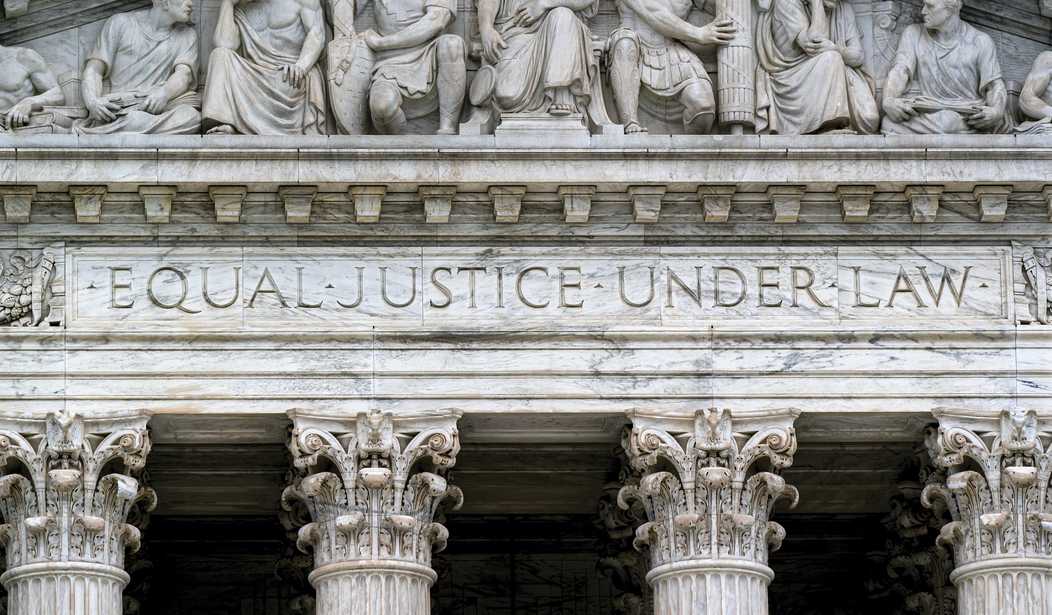As President Donald Trump might say, this is "yuuuge."
On Thursday, the Supreme Court issued unanimous rulings in two cases of major significance. One of the cases, Ames v. Ohio Department of Youth Services, has further fired up the debate over the insanity of DEI (debate regarding diversity) initiatives, which were commonly implemented in higher education, the corporate world, and even the U.S. Armed Forces throughout the damaging four years of the Biden-Harris administration.
While the answer to the question — Is DEI DOA? — is not yet "Yes," the obscene notion is definitely on life support, and hopefully will not survive.
As reported by my colleague Sister Toldjah on Thursday, in the Ames case, the Supreme Court sent the case of a "straight" (heterosexual, or as the loons on left have labeled it, "cisgender") Ohio woman, who contends she was the victim of "reverse discrimination," back to the lower courts.
READ MORE: Supreme Court Hands Down Huge Ruling in Ohio 'Reverse Discrimination' Case
In a unanimous ruling by Justice Ketanji Brown Jackson, the justices explicitly rejected the imposition of additional burdens on members of any "majority group," including heterosexual white males, prompting renewed scrutiny of such initiatives.
The decision is expected to intensify legal challenges alleging "reverse discrimination."
Before We Continue, a Word About 'Reverse Discrimination'
Let's go bottom-line, here.
There is no such thing as "reverse discrimination," just as there is no such thing as "reverse racism."
Discrimination is discrimination. Racism is racism. Period. It's important that the wise among us continue to make that point when warranted. It might not be tantamount to "biological male," but similarly, "male" covers it, as does "female," rather than the equally redundant "biological female."
Anyway, George Washington law professor and political commentator Jonathan Turley on Friday also shared his thoughts on the Ames decision:
The immediate question before the Court was a circuit split over the standard that applies to a member of a “majority” group who claims that he or she was treated unfairly based on majority characteristics. The Sixth Circuit, along with four other circuits, held that such litigants must shoulder additional pleading burdens under Title VII of the Civil Rights Act.
Many of us have long argued that this long-standing rule was itself discriminatory and at odds with both constitutional and statutory authority. It was a bizarre interpretation of a law that barred employees from discriminating based on “race, color, religion, sex, and national origin.” That would ordinarily require a plaintiff to support a claim of disparate treatment by showing that she applied for a position for which she was qualified but was rejected under circumstances giving rise to an inference of unlawful discrimination. However, judges began to add their own burden of white, male or straight litigants in requiring them to show additional “background circumstances” that show the defendant is an “unusual employer” that discriminates against majority groups.
In this case, Marlean Ames, a heterosexual woman, claimed that she was demoted at the Ohio Department of Youth Services after Ginine Trim, a gay woman, replaced her supervisor. Trim hired a younger gay man allegedly based on sexual orientation. Both the district court and the Sixth Circuit dismissed the complaint because Ames failed to identify any other “background circumstances” that demonstrated her employer discriminated against heterosexual women.
As a textual matter, Title VII’s disparate-treatment provision draws no distinctions between majority-group plaintiffs and minority-group plaintiffs. Rather, the provision makes it unlawful “to fail or refuse to hire or to discharge any individual, or otherwise to discriminate against any individual with respect to his compensation, terms, conditions, or privileges of employment, because of such individual’s race, color, religion, sex, or national origin.” The “law’s focus on individuals rather than groups [is] anything but academic.” Bostock v. Clayton County (2020). By establishing the same protections for every “individual”—without regard to that individual’s membership in a minority or majority group—Congress left no room for courts to impose special requirements on majority-group plaintiffs alone.
In layman's terms, SCOTUS found that the practice of requiring white, male, or heterosexual litigants to show circumstances over and beyond those required by litigants of color or members of the LGBTQ+ community to be unconstitutional.
And in my own terms, the additional requirements are (pick one or more) racist, blatant discrimination, and insane.
ALSO CHECK OUT: Sotomayor Plays Partisan Card, Calls on Lawyers to 'Fight This Fight' Against Trump Administration
Also on Thursday, the Supreme Court ruled unanimously:
In Catholic Charities Bureau v. Wisconsin Labor and Industry Review Commission, the Supreme Court was asked to decide whether the state of Wisconsin was violating the First Amendment’s religious freedom protections by denying a faith-based tax break to a group of Catholic nonprofits.
The nonprofits said their service to people in need was clearly motivated by Catholic teachings, but Wisconsin officials said they didn’t qualify for the religious exemption to the state’s unemployment tax because they did not seek to serve only Catholics or evangelize to their clients, as the Deseret News previously reported.
State officials won in front of the Wisconsin Supreme Court, which said that the Catholic nonprofits’ work did not serve “primarily religious purposes.”
In Thursday’s unanimous decision, the Supreme Court reversed that decision, ruling that Wisconsin was violating the First Amendment by privileging certain religious beliefs and actions over others.
Never Forget:
The terms "diversity," "equity," and "inclusion" don't mean to Democrats, their radical leftist comrades, and the left-wing lap-dog media what they mean to the honest, moral, and objective among us.
For that reason and others, we must continue our attempt to cut off the head of the DEI snake at every opportunity.














